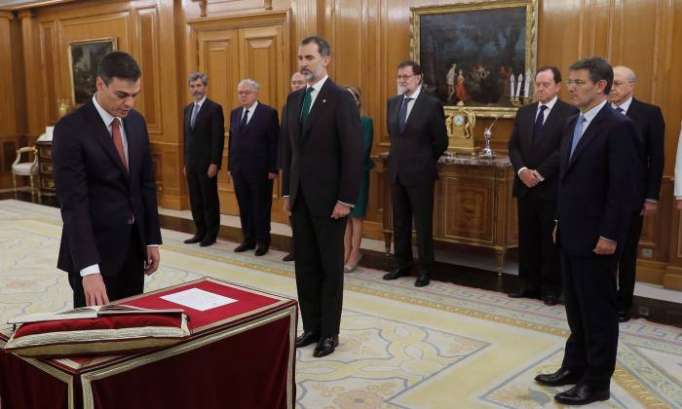Sánchez, whose PSOE party relied on support from the anti-austerity Podemos party as well as Basque and Catalan nationalists to depose Rajoy, will have to govern with just 84 MPs in Spain’s 350-seat parliament.
The 46-year-old former economics professor has promised to address the “pressing social needs” of citizens in the country still plagued by high unemployment and the effects of the financial crisis, but he faces an uphill battle. Analysts warn that parliamentary consensus will be in short supply, making significant social reforms hard to achieve.
Not only is the PSOE competing against Podemos for left-leaning voters, the centre-right Ciudadanos has recently surged ahead in the polls and is trying to edge out Rajoy’s wounded People’s party (PP) on the right.
Ciudadanos steadfastly refused to back the no-confidence motion against Rajoy, saying it would never align itself with “populists and nationalists” and calling instead for snap elections.
Antonio Barroso, an analyst at the political risk advisory firm Teneo Intelligence, said that despite this political earthquake, some things hadn’t really changed.
“Before this happened, you had a fragmented parliament with a minority government that had to look for the support of other parties to pass legislation and stay in power,” he said.
“Now what you have is a minority government that needs the support of other parties to pass legislation. You still have that fragmentation in parliament that will make decision-making very difficult.”
Sánchez has rejected calls from Pablo Iglesias, the leader of Podemos, to form a leftwing coalition government, insisting his will be a purely PSOE administration. “Iglesias thinks that the only way of recovering momentum is basically piggybacking Sánchez’s victory,” said Barroso.
Podemos, which threatened to overtake the PSOE as the dominant party of the left in the run-up to the last general election two years ago, has begun to stall as its internal ideological divisions come the the surface. Iglesias was also recently forced to defend his and his partner’s decision to buy a €600,000 house outside Madrid after they were accused of betraying the party’s principles.
“The more Iglesias can focus on policy outcomes and on this kind of stuff, the less people will be talking about Podemos’s problems,” said Barroso. “The future of Podemos depends on its co-operation – and competition – with the PSOE.”
The PP has already warned the socialists to expect fierce opposition from them, accusing Sánchez of entering office “through the back door”. Ciudadanos is expected to be equally aggressive after finding itself on the wrong side of the debate.
“There’s no doubt that Ciudadanos’s strategy has failed in the short term,” said Pablo Simón, a political scientist at Carlos III University in Madrid.
“The circumstances didn’t suggest that Sánchez would be successful, but its idea of painting itself as the only party calling for snap elections has left it out of the game.”
As Ciudadanos tries to claw back the initiative, he added, it will show no quarter to the stricken PP or anyone else. “Ciudadanos is going to try to capitalise on all that turbulence to make itself the pre-eminent opposition party,” he said.
“It’s going to carve out a far tougher profile against Sánchez’s government and Podemos and the nationalist parties to try to snatch away the PP’s place on the centre-right.”
However, bickering and politicking in the congress of deputies is far from Sánchez’s only problem as he enters the Moncloa palace.
Today also saw the new Catalan government of hardline nationalist Quim Torra sworn in, and with it the lifting of eight months of direct rule from Madrid. The two main pro-independence Catalan parties backed the no-confidence motion against Rajoy, and Sánchez has promised dialogue to try to resolve the “institutional crisis” provoked by the Catalan independence movement.
But the political impasse that dogged Rajoy’s administration appears unlikely to fade away.
Torra is adamant that his deposed predecessor, Carles Puigdemont, remains the “legitimate president” of Catalonia despite being sacked by Rajoy for unilaterally declaring independence from Spain.
Sánchez, meanwhile, has said that any negotiations will have to abide by the constitution, which stresses the “indissoluble unity of the Spanish nation”.
More about: #Spain
















































